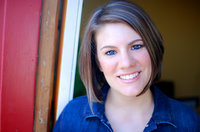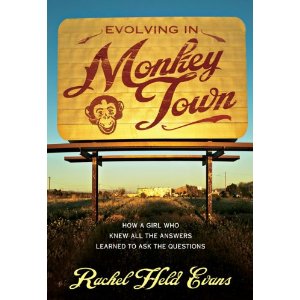 New author Rachel Held Evans and I are kindred spirits. We share a publisher, we both grew up in
New author Rachel Held Evans and I are kindred spirits. We share a publisher, we both grew up in
intensely religious home environments and were on-fire-for-God kids, and
we both have come out of the closet as Christians who struggle with
uncertainty about our faith. Though each of us approaches doubt from a different
angle (keep reading), we’re doing it from the same place. We both
realize how important community is in this process, so I’m thrilled to
have gotten to know her over the last year, and I’m also excited to introduce you to her new book, Evolving
in Monkey Town: How a Girl Who Knew All the Answers Learned to Ask the
Questions.
Nutshell: if you read and enjoyed O Me of Little Faith, you’ll love Rachel’s debut, too. Here’s a sample passage…
What my generation is learning the hard way is that faith is not about defending conquered ground but about discovering new territory. Faith isn’t about being right, or settling down, or refusing to change. Faith is a journey…
I’m no longer ready to give an answer about everything. Sometimes I’m not ready because I feel that an answer does not do justice to the seriousness or complexity of the question. Sometimes I’m not ready to give an answer because I honestly don’t know what the best one is. Sometimes I’m not ready to give an answer because I can tell that the person asking doesn’t really want one anyway.
[Evolving in Monkey Town, p. 220-221]
I’ve interviewed Rachel in the past, but now that the book has released, I took the opportunity to ask her a few more questions. Hop aboard the train to Monkey Town.
—————-
JB: Both of our books are about doubt and questions and come from the
same publisher. You endorsed me. I endorsed you. Clearly we two are
slathered in bias. But having read both of our books, how would you
compare them? From your perspective, what does Monkey Town offer that
differs from my book?
RHE: Wow, “slathered in bias” sounds kind of messy…but yeah, we do have a
lot in common. We both talk openly about doubt. We both ask tough
questions. We both seem to have an affinity for animal metaphors (you,
turtles; me, monkeys). But I think our voices are different enough and
our experiences unique enough to make our books resonate in different
ways with different readers.
In Evolving in Monkey Town I spend a little more time wading through
some of the theological questions that led me to doubt. [Those who
have read O Me of Little Faith will understand what I mean when I say
that Jason had the good sense to start with the bottom turtle while I
had to go knocking all the little guys off the top.] And of course,
my story comes from small-town Southern America, where asking pesky
questions about religious pluralism, biblical inerrancy, conservative
politics, and evolution can get you into some trouble!
Both of us grew up in religious subcultures that haven’t always
been open to questioners. How did you find the freedom to break out of
that mindset? Why is it important for Christians to ask hard
questions?
I never really set out to be a questioner. It just sorta happened when
the answers I’d memorized all my life didn’t make sense to me anymore.
Of course, not everyone is thrilled with my story. But I’m really
fortunate in the fact that the people closest to me–my parents, my
husband, even my pastor–have left enough room within their view of
orthodoxy to allow someone like me to wrestle and grow. Still, it’s
taken me a while to accept that not everyone is going to struggle with
doubt like me, that not everyone is going to ask hard questions about
their faith. But I think it’s important for Christians who do have
questions to ask them honestly and without fear to avoid living a sort
of “fake faith.” In the book I put it this way, “If there’s one thing
I know for sure, it’s that serious doubt–the kind that leads to
despair–begins not when we start asking God questions but when, out of
fear, we stop.”
Evolution plays a big role in your book and your “conversion” from
a too-certain believer to a doubter. Especially since you live and
grew up in Dayton. It’s such a hot-button issue for believers today,
many of whom fear that an acceptance of evolution means starting down
a slippery slope where you end up not being able to believe the Bible
at all. How do you respond to that?
It’s a good question, and I can relate to the people who ask it. But
the challenge of “where do you draw the line?” is not one that only
evolutionary creationists have to be able to respond to, for most
people would distance themselves from an interpretation of Scripture
that would require continued belief in a solid firmament above that
holds back the waters (Genesis 1:6-8) or a stationary earth (1
Chronicles 16:30; Psalm 93:1). We all face the challenge of drawing a
line when we are interpreting an ancient text. It really comes down to
genre–and I interpret the creation account of Genesis to be a much
different genre than say, the gospel of John or the letters of Paul.
You’ve described yourself as “a girl who learned to ask the
questions.” What religious questions are you asking now? Which one
bothers you the most?
Right now I’m wrestling with that awful, nagging question that always
seems to return–What if this is just wish-fulfillment? What if I’m a
Christian simply because I desperately want my life to have meaning…or
because I’m afraid of death? What if religion is just humanity’s way
of coping with our fears surrounding life’s mysteries?
—————-
Come back tomorrow for part two of the interview, in which Rachel parses the phrase “Christian skeptic,” talks about how her personal faith has evolved since she finished writing, and tells how a first-time writer from a small town got a national book deal.
In the meantime, what do you think about Rachel’s thoughts about biblical inerrancy and the theory of evolution? Where do YOU draw the line when it comes to applying an ancient text in a modern context?

